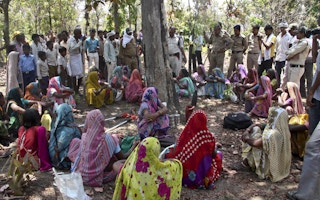Greenpeace International urged Indian authorities on Monday to ensure a democratic decision-making process for the residents of Amelia village, Singrauli, a district in the state of Madhya Pradesh, once they cast their votes once again over Mahan Coal Ltd’s proposed coal mine development in the Mahan forest. This was after the initial round of voting last year was marred by corruption and intimidation.
The fate of the Mahan forest over the coal extraction plan remains uncertain as the second village council vote that was expected this week was called off indefinitely, after Singrauli’s chief administrator M. Selvedran, who was supposed to facilitate the voting process, was transferred to Bhopal just before the scheduled council meeting could take place.
Local community members and Greenpeace disputed the results of the first decision held under the Gram Sabha, or the voting of all adult citizens in the village during a council meeting in March last year, which favoured Mahan Coal by allegedly securing over 1,200 signatories. They claimed that the meeting was marred by corruption involving the forgery of votes and intimidation from the company in order to secure agreement.
“If we Indians want to showcase our country as a model of inclusive development and democracy, the intimidation of villagers and any attempts to hold this vote behind closed doors must end now,” commented Greenpeace India campaigner Priya Pillai.
“
Saving the Mahan forest can still be remembered as India’s turning point. It’s not too late
Kumi Naidoo, Executive Director, Greeenpeace International
The consent of the forest community is a legal requirement for Mahan Coal Ltd to commence its operations in the nearly 10 square-kilometre Mahan coal block, situated on the periphery of the 925.30 square-kilometre Mahan forest reserve.
If the energy firm succeeds in securing the rights from the villagers, it could generate about 150 million tonnes of thermal coal from the approved area. The firm, which is a joint venture between London-listed Essar Energy and Indian conglomerate Aditya Birla’s Hindalco Industries, got the environment clearance to the mining plan from the government in 2007, another issue that local groups believe was also fraught with irregularity.
Mahan Coal’s chief executive officer Ramakant Tiwari was quoted as defending the company’s stand on the issue of rights to the forest by Indian media earlier this month. “There is not a single person or family (and, hence, no scheduled tribes or other traditional forest dwellers) residing in the forest area of Mahan coal block. Thus, in a strict sense, claims being made by vested interests are outside the preview of The Schedule Tribes and other Traditional Forest Dwellers (Recognition of Forest Rights) Act, 2006.”
Tiwari further argued that the company has agreed to pay an annuity to the villagers living adjacent to the forest land, with the amount that will be determined by the state government.
“All compensation has been paid as per government norms even before the project has started and the villagers are being paid compensation on a regular basis. Besides the compensation pay-outs, the cumulative population of three villages, which is around 5000, have benefitted from our community development initiatives,” Mahan Coal said in its website.
But environmental and local community groups are against the project as it could result in the felling of about 400,000 trees. It could also affect the biodiversity in the forest, with over 102 migratory species present in the area, according to the Global Register of Migratory Species.
Pillai said the Mahan coal mine will not only add carbon dioxide emissions into the atmosphere, posing further climate risk to the community, but it will also destroy the livelihoods of thousands of people who depend on the Mahan forest for survival.
She noted that the environmental impact of the proposed coal mine will affect not only one village, but also neighbouring villages that depended on the forest. Therefore, the right to vote must be extended to them as well, she said. “We call for the government to recognise the rights of the community and hold a fair and transparent vote, not only in one village, but in all the 54 villages that depend on the Mahan forest,” stressed Pillai.
Greenpeace, which has been campaigning for the forest rights and livelihoods of the villagers, has also reported harassment cases, including the sequestering of communication equipment and the arrests of its activists. Essar also filed a defamation lawsuit against the campaigns group early this year after 14 Greenpeace forest activists scaled the company’s headquarters, unfurling a giant banner that protested against deforestation.
“The ongoing crackdown against forest rights activists will not deter our resolve but only makes us more determined to save the Mahan forest,” Pillai added.
Greeenpeace International Executive Director Kumi Naidoo emphasised the need for the country to move away from polluting energy sources such as fossil fuels.
He called the energy project as a “recipe for environmental and human disaster” and asked the government to focus instead on clean energy solutions for at least 300 million Indians who still lack access to electricity.
“Saving the Mahan forest can still be remembered as India’s turning point. It’s not too late,” Naidoo said.

















